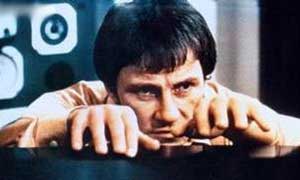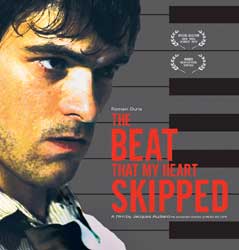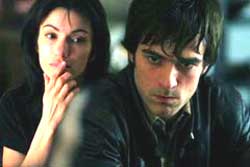Though rarely included on lists of the best American gangster films, Fingers (1978) really should be given consideration when such lists are being trumped up. It's one of Harvey Keitel's finest performances. First-time director James Toback had already done the screenplay for the nihilistic James Caan vehicle The Gambler (1974), suggesting a genius in the making. For whatever reasons, for the next couple decades Toback would never do a better film than Fingers, though he would direct a few things with greater financial success.
 Jimmy Agenelli, played by then-unknown Harvey Keitel, is the son of an aging small-time gangster (Michael V. Gazzo). He's a "collector" running errands for his dad's gambling enterprise. He's at the same time a potentially gifted pianist though he can only play his best when he's completely alone. Jimmy Agenelli, played by then-unknown Harvey Keitel, is the son of an aging small-time gangster (Michael V. Gazzo). He's a "collector" running errands for his dad's gambling enterprise. He's at the same time a potentially gifted pianist though he can only play his best when he's completely alone.
The s/m sequence in the bathroom when Jimmy rapes a gangster's girlfriend (marvelously played by Tawnya Roberts), she goes along with it quite eagerly, so it isn't really rape. Only when he's finished does she realize what an extreme bastard she just did it with.
He's a hyperactive horndog who needs to see the proctologist for having strained himself. He views sexual prowess as a kind of extreme sport, rather than something to enjoy, & thereby has hurt his pecker. His womanizing appears to be a reactionary response to repressed attraction to men, at whom he sometimes gazes longingly.
An oddball to be sure, Jimmy carries a boombox with him everywhere he goes so that his whole life has a soundtrack of pop tunes. He has fallen in love, at first sight, with the aloof artist Carol (Tisa Farrow, Mia's sister) who is weird enough it almost seems they'd be a good match. At least Jimmy thought so.
Jim Brown plays Dreems, an ex-boxer clubowner who caters to gangsters & is a bit of a pimp. Carol is one of his girls. Though at first she seemed really to like Jimmy, she soon figures out he's a sissy underneath his gangster veneer, a momma's boy whose momma lives in a mental asylum. A cruel streak induces Carol to play the emotionally crippled Jimmy against her pimp's physical mightiness & seeming surety. Jimmy wallows almost happily in the humiliation.
Jimmy's loud loony dad wants him to do a hit, but Jimmy's never killed anyone, & doesn't want to start now.
Even as the situation builds to the point where it's obvious his dad is going to be murdered, Jimmy just can't kill, until it's matter of vengeance, when the pent-up frustrations of his life erupt into a shocking level of violence.
The stairwell fight with his father's killer Riccamonza (Tony Sirroco) is gross & cool. By the close, it's clear that an interest in music isn't the only thing Jimmy has inherited from his insane mother, despite that Carol had asserted, "You're not crazy. You're just scared."
This is a very early performance for Keitel who creates a multilayered character. But he been hanging out with a young Christopher Walken, & now & then he's fairly obviously playing the character as though he were Walken.
The one unconvincing aspect of his performance is the piano playing. He bobs his head wildly & exaggeratedly, but in his arms & shoulders we can tell he's not really playing. Other than this visual error, however, it's easy to see Keitel is even at this young age a fully rounded actor. There's a "glance" he gives the camera at the very end which is so insane, so misery-ridden, so chilling, that it actually made me jump in my seat.
 Fingers was remade in France as The Beat That My Heart Skipped (Da battre mon coeur s'este arrete, 2005). It, too, is a good film, perhaps less well known than it deserves to be merely because the title suggests a love story. Fingers was remade in France as The Beat That My Heart Skipped (Da battre mon coeur s'este arrete, 2005). It, too, is a good film, perhaps less well known than it deserves to be merely because the title suggests a love story.
For income, Thomas (Romain Duris) works for slum lords or developers, forcing families out of apartments so they can be torn down. His methods are not kind. His aging father (Niels Arestrup), an over-the-hill gangster, likes to use his son as a dun for recalcitrant tenants.
In his heart, Thomas is not a thug, or shouldn't've become one. His mother died in an asylum. For ten years he had not kept up with his music, his mother having been a concert pianist of note until marriage to a gangster destroyed her, & she had been young Thomas's primary support in pursuing music, as well as being his teacher. After all this time, he has begun to think seriously again about the life he might have had as a musician.
He's unexpectedly invited to an audition & sees before himself a divided path, one fork toward increasing criminality which would please his father, the other as a musician in honor of his mother & all that he can find to value within himself.
Neither path can realistically succeed, as he is neither tough enough nor sufficiently connected to long survive the gangster world. Plus, though he can't see it, he's really only an amateur pianist without his mother's gift. His invitation to a significant audition was something of an error inspired by a fond remembrance by the conservatory professor (Emmanuel Finkiel) for Thomas's late mother.
 Instead of living on the cusp of madness, as his mother did, he lives on the cusp of being a twinkus, a dork, a fool, & conceivably gay besides, though he can't face that in himself any more than he can face the mediocrity of his talent. He daren't see himself for what he is, & dreams beyond his skills to achieve, as many people do. He could be mistaken for mentally ill, but seems more self-deluding. Instead of living on the cusp of madness, as his mother did, he lives on the cusp of being a twinkus, a dork, a fool, & conceivably gay besides, though he can't face that in himself any more than he can face the mediocrity of his talent. He daren't see himself for what he is, & dreams beyond his skills to achieve, as many people do. He could be mistaken for mentally ill, but seems more self-deluding.
His dad gets badly beaten trying to get his money back on a real estate scam gone bad. Minskov (Anton Yakovlev) who robbed his father is behind it. After Thomas botches the piano audition into which he'd invested far too much emotion, he's pushed a little closer to the edge.
When the son discovers what the Russian mob did to his father, the original American film with Harvey Keitel focused thereafter on the matter of revenge, & of the deterioration of Fingers' mental state. But the remake varies strongly from the original script at this point.
Events move two years into the future & despite everything we've been lead to feel & believe about Thomas, his love life has somehow gotten pretty good & completely hetero, & his musical career has most improbably gotten well off the ground, though in a different context than he'd expected: He's a successful music coach & manager for a gifted young woman (Linh Dan Pham). A classic case of those who can't do it, teach it.
By the end, Thomas's revenge is not as absolute as was that of Fingers, & his final gaze is one of healing instead of madness. For cynics like me this is not as good an ending, & certainly Harvey Keitel's final gaze is one of the most terrifying acting moments in the history of cinema for which nothing in Romain Duris's performance as Thomas compares.
But the remake has way better music, & Duris is more convincing playing piano. And viewers who like a dose of hope in their tragedies will prefer the subtleties of the remake to the overstatements of the original.
copyright © by Paghat the Ratgirl
|

 Jimmy Agenelli, played by then-unknown Harvey Keitel, is the son of an aging small-time gangster (Michael V. Gazzo). He's a "collector" running errands for his dad's gambling enterprise. He's at the same time a potentially gifted pianist though he can only play his best when he's completely alone.
Jimmy Agenelli, played by then-unknown Harvey Keitel, is the son of an aging small-time gangster (Michael V. Gazzo). He's a "collector" running errands for his dad's gambling enterprise. He's at the same time a potentially gifted pianist though he can only play his best when he's completely alone.
 Instead of living on the cusp of madness, as his mother did, he lives on the cusp of being a twinkus, a dork, a fool, & conceivably gay besides, though he can't face that in himself any more than he can face the mediocrity of his talent. He daren't see himself for what he is, & dreams beyond his skills to achieve, as many people do. He could be mistaken for mentally ill, but seems more self-deluding.
Instead of living on the cusp of madness, as his mother did, he lives on the cusp of being a twinkus, a dork, a fool, & conceivably gay besides, though he can't face that in himself any more than he can face the mediocrity of his talent. He daren't see himself for what he is, & dreams beyond his skills to achieve, as many people do. He could be mistaken for mentally ill, but seems more self-deluding.